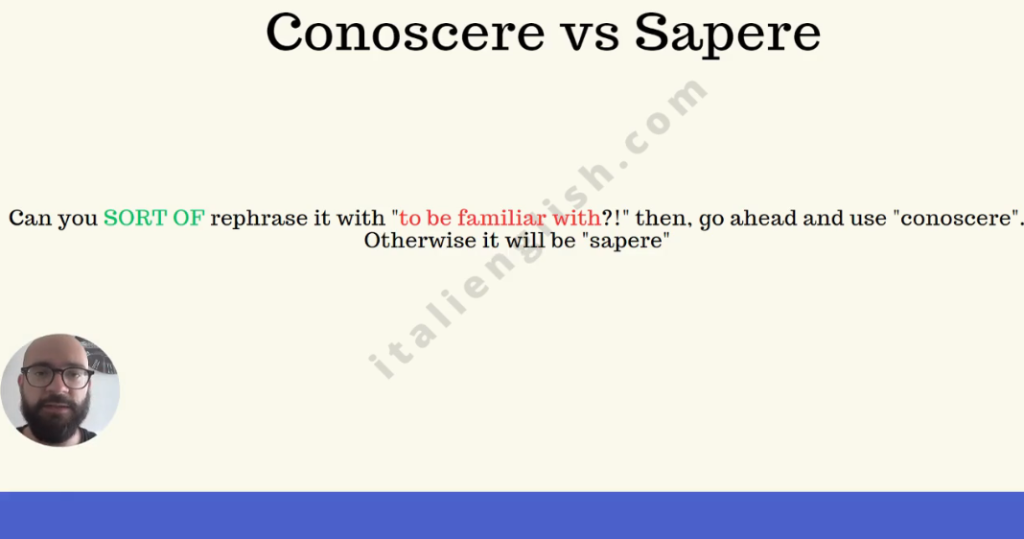Ciao! Welcome to this comprehensive blog post where we will finally unravel the mysterious differences between “conoscere” and “sapere” in the beautiful Italian language. As a language enthusiast myself (and mentor), I understand how tricky it can be to navigate through similar verbs, but fear not, I’m here to guide you through this linguistic maze. In this blog post, we will delve into the nuances of these two verbs, explore various examples, and provide you with a practical hack to effortlessly choose the right one in any situation. So, let’s embark on this journey to enhance our conversational Italian knowledge!
Content
Distinguishing “Conoscere” and “Sapere”
At first glance, “conoscere” and “sapere” might seem interchangeable as they both translate to “to know” in English. However, they serve distinct purposes in Italian and understanding when to use each one is crucial for effective communication.
“Conoscere” – Familiarity and Deep Knowledge
“Conoscere” is used to express familiarity or acquaintanceship with people, places, or things. Additionally, it can indicate knowledge of a particular subject, especially when that knowledge is deep and extensive. Let’s explore some examples:
- “Conosco Mike” (I know Mike) – Here, “conoscere” indicates familiarity with Mike.
- “Conosco la storia dell’arte molto bene” (I know art history very well) – In this case, “conoscere” signifies a deep knowledge of art history.
Notice how “conoscere” can be easily rephrased with “to be familiar with” in English. If you can replace “know” with “be familiar with” in your sentence, then “conoscere” is the right choice.
“Sapere” – Knowledge of Facts and Skills
On the other hand, “sapere” is used to express knowledge of facts, skills, or abilities, but generally not as deep as the knowledge conveyed by “conoscere.” Let’s look at some examples:
- “So che pioverà domani” (I know that it will rain tomorrow) – “Sapere” is used to express knowledge of a fact (that it will rain).
- “Sai suonare la chitarra?” (Do you know how to play the guitar?) – Here, “sapere” is used to ask about the skill of playing the guitar.
Unlike “conoscere,” “sapere” cannot be easily rephrased with “to be familiar with.” Instead, it is better suited for expressing knowledge of facts or skills.

Here’s a sneak peek from my video library. Click HERE to find out more about my mentoring program
The Hack: “To Be Familiar With” Test
Now, let’s unveil the hack that will make distinguishing between these verbs a breeze. Whenever you encounter a situation where you need to decide between “conoscere” and “sapere,” try this simple test: Can you rephrase the sentence with “to be familiar with”? If yes, then “conoscere” is the right choice. If not, then “sapere” is the one you should go for.
For instance, take the sentence “Conosco questa zona della città” (I know this area of the city). Using the hack, we can rephrase it as “I am familiar with this area of the city,” which confirms that “conoscere” is the correct verb to use in this context.
Understanding Italian is only the first step
At some point, studying on your own stops being enough.
A call helps you understand whether a guided mentoring path can help you start speaking Italian with more confidence.
Exploring More Examples
Let’s dive into some additional examples to solidify our understanding.
- “Non so come risolvere il problema” (I don’t know how to solve the problem) – In this case, “sapere” is used to express the lack of knowledge or skill to resolve the problem.
- “Non conoscevo questa marca di macchina” (I didn’t know this car brand) – Here, “conoscere” is used to convey unfamiliarity with a car brand.
- “So che il supermercato apre alle nove” (I know that the supermarket opens at nine) – “Sapere” is used to indicate knowledge of a fact, the supermarket’s opening time.
Summing It Up
To summarize, “conoscere” is your go-to verb when expressing familiarity or deep knowledge of people, places, or subjects. On the other hand, “sapere” is the right choice for conveying knowledge of facts, skills, or abilities, though not as profound as “conoscere.”
By using the “to be familiar with” test, you can confidently choose the appropriate verb in any context. Remember, language learning is a journey, and making mistakes is part of the process. So, don’t be afraid to experiment and practice using these verbs in various situations.
Conclusion
Congratulations, my friend! You have successfully navigated the complexities of “conoscere” and “sapere.” By understanding their distinctions and employing the “to be familiar with” test, you have unlocked the secret to using these verbs like a native Italian speaker. Language learning is all about continuous growth, so keep exploring, practicing, and embracing the beauty of Italian grammar.
I hope you found this blog post insightful and useful. If you have any questions or need further clarification, please feel free to reach out to me in the comments section. Grazie mille for joining me on this linguistic adventure, and until next time, happy learning!
Do you want to get access to my Italienglish Mentoring Program?
13+ hours of video library, daily assignment, accountability, live calls and private Facebook group.
In 3 months you WILL be able to speak Italian, it’s a promise!